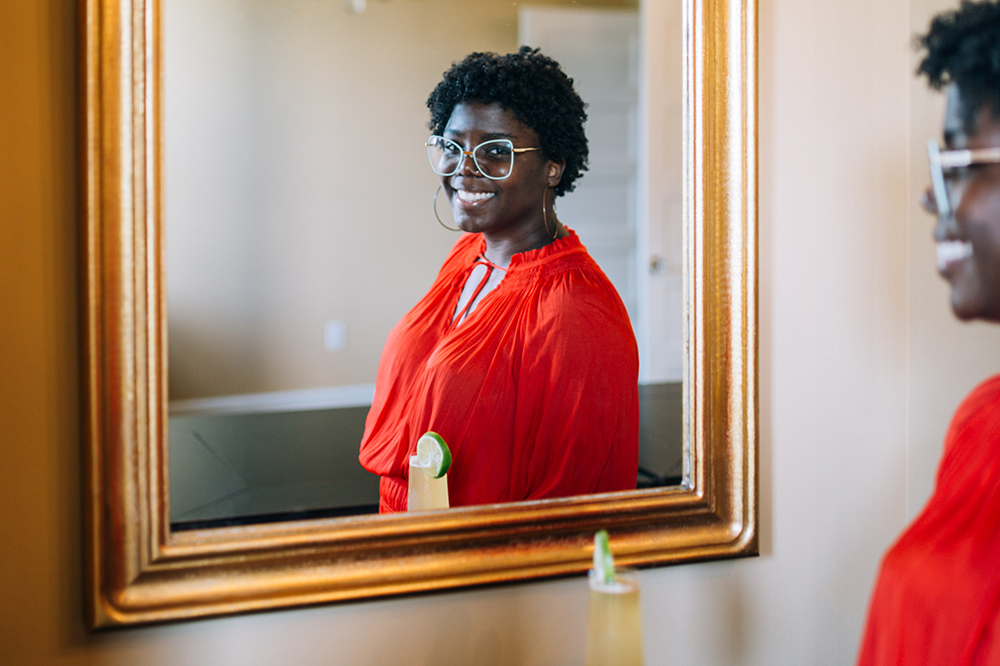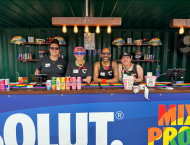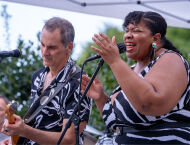Eat
 Lauren Paylor. Photo by Farrah Skeiky.
Lauren Paylor. Photo by Farrah Skeiky.
A Change is Gonna Come
July 10, 2020 @ 10:00am
Now more than ever, bars and restaurants in the D.C. area are being forced to take a hard look in the mirror. Hiring practices, promotions, educational opportunities and company culture are only a few issues that have displayed discrepancies within the food and beverage sector. Some companies are even working with human resource companies and diversity and inclusion businesses to update their training manuals and guidelines, train their staff and managers, and turn over a new leaf.
“It is frustrating to me that there have been all of these performative measures from our governmental structures that say, ‘Okay, we are doing something about this, but these problems still exist,” says Courtney Shepard, a white woman who has been in the food and beverage industry for years and currently works at D.C.-based urban farm Little Wild Things.
“It has been very apparent to me that back of house remains largely people of color and front of house is usually largely white,” Shepard adds. “There is no excuse for that anymore.”
Shepard’s observation is accurate, and this is only one of the many issues in the food and beverage industry that exists today. We are all familiar with the story of the McDonald’s employee who fought back in Florida last year. Yasmine James, a 20-year-old Black woman, fought off a 40-year-old white man who attacked her and dragged her against the fast food restaurant’s countertop. When the attacker was not given a straw with his order, he became irate and made discriminatory remarks. James was left to protect herself with no help from staff or management, and even had to call the police after the incident. This is absurd.
In 2017, a bouncer at El Centro D.F. on 14th Street denied a Black man entry because he was wearing sneakers, while white patrons wearing sneakers were allowed to enter. That employee was immediately fired. What precedent does this behavior set for your employees?
“As a food and beverage professional, I am not entirely aware of what my rights are from a patron side or an employee side,” Imani Williams says.
Williams, a Black person who currently works at coffee shop and bar Colony Club in Park View, does believe they could have potentially avoided several situations over the years if they were aware of their rights.
“I feel like I was not properly trained,” they say of their first management role at 19 years old. “They threw me into the position. I was not prepared, and their expectations were unrealistic.”
This happens all too often. There is an acceptable and unacceptable way to act, according to society. The world is not binary. It is not black and white. When Black people receive accolades, awards and accomplishments, it doesn’t eradicate the oppression they face.
“You speak so well” is a phrase I know very well. This is an exceptionalizing stereotype, a type of racial microaggression in which an action is framed as interpersonally complimentary but perpetuates negative stereotypical views of a racial or ethnic group.
“This couple came in while I was in the middle of a very busy service and said, ‘You know a lot about wine for a Black girl,’” says Simone Mayers, a former bartender at The Royal who now works as a yoga instructor and wellness coach. “It hurt my feelings because I worked really hard and was really good at pairing food and wine. I had just been promoted to bartender trainer and was feeling good. I immediately felt small. They thought it was a compliment.”
Mayers says her face dropped when the comment was made and the guests proceeded to ask, “Oh no, did we say something wrong?”
Black people often experience tokenism or “the practice of doing something (such as hiring a person who belongs to a minority group) only to prevent criticism and to give the appearance that people are being treated fairly,” according to Merriam-Webster. Establishments are doing themselves a disservice by not keeping the conversation open.
Diversity, equity and inclusion are a few ways in which businesses can avoid being active participants in tokenism. Diversity and inclusion companies add a surplus of value to establishments. When you are able to put a word to an action, you can eliminate the possibility of being involved in an unjust act. Additionally, you are able to intervene and take action when these situations arise.
Over the last month or so, we have seen the D.C. community come together to lead protests asking for major changes in the judicial system following George Floyd’s death while also organizing food, water and supplies for protesters, and standing in solidarity with the Black community. And in early June, Mayor Bowser had a Black Lives Matter mural painted on the street leading up to the White House.
In mid-June, we saw a major shift in the way Dupont Circle-based farmers market FreshFarm selects its vendors. This change was spurred by Puddin’ owner and chef Toyin Alli, who spoke up on behalf of herself and other Black-owned businesses previously excluded from the market’s busiest location. Changes like these allow for a more diverse showcasing of vendors and farmers to ensure there is BIPOC (Black, indigenous and people of color) representation. FreshFarm has already added four Black-owned businesses. In addition, Colony Club recently decided to change the name of their business after five years.
“After talking with staff and customers, we’ve learned that the power of that word to hurt is real – no matter the justification for using it,” owner Max Zuckerman says.
In late June, cocktail bar Serenata’s beverage director and partner Andra “AJ” Johnson hosted Back to Black, a virtual cocktail pop-up for charity. Roy Boys’ Frank Mills, Thamee’s Richard Sterling and Reliable Tavern’s Kapri Robinson collaborated on the event, along with Maydan and Compass Rose’s new executive pastry chef Paola Velez. Johnson and Robinson are the powerhouses behind DMV Black Restaurant Week and Chocolate City’s Best, respectively. Both aid in amplifying the voices of Black food and beverage professionals in the DMV area.
“The purpose of the event was to find a way to mobilize and activate people in the community and the hospitality industry,” Johnson says.
The Back to Black pop-up raised more than $11,000 over the course of two days, all donated to various charities supporting the Black Lives Matter movement. There is no need to reinvent the wheel. This is a great example of a way to involve the community and promote individuals in the hospitality sector, all while raising money for charity.
I urge you all to get involved, and there are many ways to begin. I advise doing extensive research to familiarize yourself with foreign words and terms, being open to dialogue and having conversations about pressing matters in our country, and supporting local Black-owned businesses and local charities. A few of many businesses and organizations you can support are listed below. Together, we’ll make this place a better world to live in. A change is gonna come.
Local, Black-Owned Food + Drink
Ben’s Chili Bowl // www.benschilibowl.com
Bukom Cafe // www.bukomcafe.com
Calabash Tea & Tonic // www.calabashtea.com
Cane // www.cane-dc.com
DCity Smokehouse // www.dcitysmokehouse.com
EatOkra app // www.eatokra.com
Florida Avenue Grill // www.floridaavenuegrill.com
Georgetown Butcher // www.georgetownbutcher.com
HalfSmoke // www.halfsmoke.com
Here’s The Scoop! // www.heresthescoopdc.com
MLK Deli // www.themlkdeli.com
Negril the Jamaican Eatery // www.negrileats.com
NuVegan Café // www.ilovenuvegan.com
Oohh’s & Ahh’s // www.oohhsnaahhs.com
Po Boy Jim Bar & Grill // www.poboyjim.com
Puddin’ // www.dcpuddin.com
Sankofa Video Books & Café // www.events.sankofa.com
Sweet Home Café at the National Museum of African
American History and Culture // www.nmaahc.si.edu
(Temporarily closed due to Covid)
The Sweet Lobby // www.sweetlobby.com
Zenebech Restaurant // www.zenebechdc.com
D.C. Community Resources
Black Artists of DC // www.blackartistsofdc.com
Black Lives Matter DC // www.blacklivesmatterdmv.org
Chocolate City’s Best // www.chocolatecitysbest.com
DMV Black Restaurant Week // www.dmvbrw.com
Freedom Fighters DC // Follow on Instagram @freedomfightersdc
Life Pieces to Masterpieces // www.lifepieces.org
NAACP // Washington, D.C. Branch // www.naacpdc.org
National Coalition of 100 Black Women // www.ncbw.org
National Museum of African American History & Culture // www.nmaahc.si.edu
Lauren Paylor is a freelance writer, bartender and co-founder of health and wellness company Focus On Health. She is based in Silver Spring, Maryland by way of New York City.
Enjoy this piece? Consider becoming a member for access to our premium digital content and to get a monthly print edition delivered to your door. Support local journalism and start your membership today.







